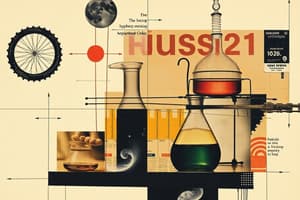Podcast
Questions and Answers
Which of the following is a key characteristic of a well-formulated scientific hypothesis?
Which of the following is a key characteristic of a well-formulated scientific hypothesis?
- It must be related to the original research question and be testable (correct)
- It should be written using vague or ambiguous language
- It must be based on personal beliefs and opinions
- It should not be testable or falsifiable
How does the scientific method contribute to scientific knowledge according to the text?
How does the scientific method contribute to scientific knowledge according to the text?
- By disregarding hypotheses without testing them
- By relying solely on observational data without experimentation
- By ensuring hypotheses are rigorously evaluated through experimental testing (correct)
- By forming hypotheses without any experimental validation
What is the primary purpose of hypothesis testing in the scientific method?
What is the primary purpose of hypothesis testing in the scientific method?
- To evaluate ideas and theories based on empirical evidence (correct)
- To confirm the researcher's preconceived notions about the subject matter
- To generate new research questions for future studies
- To ensure the experiment is conducted using proper scientific protocols
What key role did smell play in Hasler's study according to the text?
What key role did smell play in Hasler's study according to the text?
What is the central focus of the behaviorism school of thought in psychology, as exemplified by Pavlov's experiments?
What is the central focus of the behaviorism school of thought in psychology, as exemplified by Pavlov's experiments?
What was the main focus of Arthur Davis Hasler's study on Coho salmon homing ability?
What was the main focus of Arthur Davis Hasler's study on Coho salmon homing ability?
How did the results of Hasler's experiment challenge the initial hypothesis?
How did the results of Hasler's experiment challenge the initial hypothesis?
What was the key hypothesis that Pavlov tested through his experiments on dogs?
What was the key hypothesis that Pavlov tested through his experiments on dogs?
How did Pavlov's experiments on dogs contribute to the development of the scientific method?
How did Pavlov's experiments on dogs contribute to the development of the scientific method?
What is the significance of rejecting incorrect hypotheses in the scientific method?
What is the significance of rejecting incorrect hypotheses in the scientific method?
How do hypotheses play a crucial role in scientific research?
How do hypotheses play a crucial role in scientific research?
Which of the following is a key characteristic of a well-designed scientific experiment, as exemplified by Pavlov's work?
Which of the following is a key characteristic of a well-designed scientific experiment, as exemplified by Pavlov's work?
Flashcards are hidden until you start studying
Study Notes
Scientific Hypotheses and Their Tests
Hypothesis tests play a crucial role in the scientific method, enabling researchers to evaluate ideas and theories based on empirical evidence. By proposing predictions derived from a hypothesis, scientists can design experiments to challenge or confirm their assumptions, leading to new insights and advancements in various fields. In this article, we delve into the concept of hypothesis testing and explore examples from renowned scientific studies.
A hypothesis is an educated guess about what will happen during a scientific experiment based on observations and can be written using the words "IF" and "THEN." The hypothesis should relate back to the original research question and must be testable and falsifiable. Let's explore some examples of famous hypotheses that were tested through carefully designed experiments.
Ivan Pavlov's Experiment
Ivan Pavlov's experiment demonstrated conditioned responses in dogs, which laid foundational principles for behaviorism, a major school of thought in psychology that emphasizes the study of observable behaviors. Pavlov started with a hypothesis about conditioned responses and tested it through controlled experiments.
Key Takeaways
- Pavlov's work exemplifies the scientific method, starting with a hypothesis about conditioned responses and testing it through carefully crafted experiments.
- His findings advanced our understanding of animal physiology and contributed to behaviorism, a significant psychological theory.
Arthur Davis Hasler's Study on Salmon Homing Ability
Arthur Davis Hasler conducted a study in 1960 to investigate the hypothesis that Coho salmon used eyesight to locate their home streams. He tested this idea by blindfolding some of the captured fish and releasing them into unfamiliar waters, expecting fewer blindfolded fish to return to their native streams if sight were crucial for homing ability. However, his experiment did not support the hypothesis, demonstrating the importance of testing hypotheses to refine our understanding of natural phenomena.
Key Takeaways
- Hasler's investigation utilized the scientific method to test a specific hypothesis about Coho salmon's homing behavior.
- His findings showed that smell plays a more significant role in guiding salmon to their home streams than previously assumed.
Scientific Method and Hypothesis Testing
The scientific method involves making observations, developing hypotheses, designing experiments, and analyzing data to evaluate and validate or refute ideas. This iterative process helps researchers build upon existing knowledge and advance scientific understanding in various disciplines. By formulating hypotheses, scientists can design experiments to test these assumptions, leading to insights into natural phenomena.
Key Takeaways
- The scientific method ensures rigorous evaluation of hypotheses through experimental testing, contributing to the accumulation of scientific knowledge.
- Rejecting incorrect hypotheses allows scientists to refine their explanations and theories based on empirical evidence.
Studying That Suits You
Use AI to generate personalized quizzes and flashcards to suit your learning preferences.






